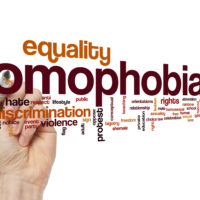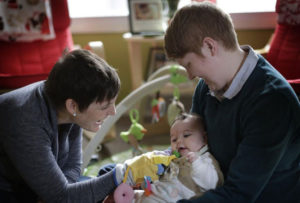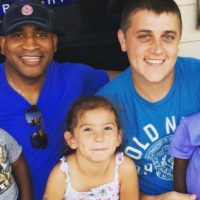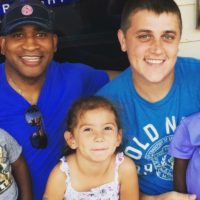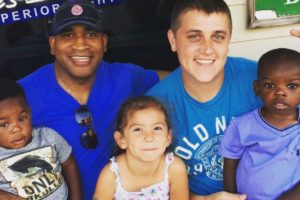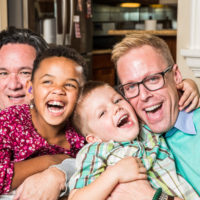When Amanda Davidson, a 42-year-old Los Angeles-based artist and writer, welcomed her firstborn child in December — a boy named Felix — with her partner Isaac Schankler, 39, a composer, she chafed at the assumptions the medical staff members made about how the pair wanted to identify themselves as parents.
“‘Hi, Mommy! Where’s Daddy? Mommy needs to know this, but so does Daddy,’” she said with a big laugh. The binary clashed so much with how the couple sees themselves and exists in the world — she’s queer-identified, and her partner goes by pronouns they/their/them and uses the gender-neutral title Mx. — she refrained from calling herself anything vis-à-vis Felix for the first two weeks of his life.
She eventually settled on Mama. “I was racking my brain for a mama-alternate, but it feels right for the moment,” she said, adding that in her universe, “identity wiggles around,” and she’s open to other possibilities.
Mx. Schankler remembers reading the queer writer Andrea Lawlor’s essay on identifying as “Baba” (as opposed to some iteration of mother) in Mutha magazine and thinking that “dad” or “daddy” wouldn’t work for them either, so they opted for “Abba.” It means “dad” in Hebrew, providing a link to their Jewish heritage: “It does feel more gender-neutral, or at least doesn’t have quite the same baggage that dad and daddy have,” Mx. Schankler said.
Naming is particularly important to the pair as a means of signaling their queerness, since they “pass” as a straight couple. “We don’t look visibly queer,” Ms. Davidson said, “So in some ways, our choice of names helps us affirm our identities.”
The duo’s ambivalence about traditional monikers is reflected in a study, currently under peer review, on the naming practices in same-sex adoptive families. The study, by Abbie E. Goldberg, Clark University’s pioneering L.G.B.T. family scholar; Melissa Manley, a doctoral student, and Emma Frank, a recent Clark graduate, is one of the few on the topic. It found that of 80 participants — 20 lesbian couples and 20 gay couples — recruited from adoption agencies across the United States, including cities with high concentrations of lesbian and gay populations, all opted for derivatives of mother and father.
A quarter of them, however — 20 percent of the lesbian couples and 5 percent of the gay couples — participated in some version of “undoing gender.” Many do this by taking parental names from their native cultures or religions that strip away the binary in this cultural context, collapsing the dichotomy between terms by merging them, such as “Mather,” a fusion of mother and father, or creating nicknames (“Muzzie,” in one instance).
Ellen Kahn, the director of the Children, Youth & Families Program at the Human Rights Campaign, said the gender binary that underlies “mother” and “father” doesn’t jibe with some parents’ self-understanding and self-presentation: “For queer parents who don’t think of themselves as gender conforming, ‘mommy’ and ‘daddy’ may be a little discordant with the way they think about themselves.”
Both Dr. Goldberg and Ms. Kahn surmise that the couples who are using new terminologies are willing to do so because of the hard-won rights L.G.B.T. people have secured, particularly the right to marry. “Now there’s more willingness to push some of those boundaries,” Dr. Goldberg said, “because of greater legal recognition and acceptance.”
by Stephanie Fairyington – New York Times April 26, 2018
Click here to read the entire article.
The post Some L.G.B.T. Parents Reject the Names ‘Mommy’ and ‘Daddy’ appeared first on Time For Families.
Source: Time for Families

